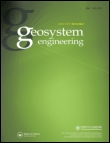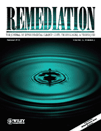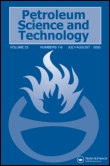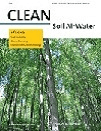
Geosystem Engineering
Scope & Guideline
Advancing sustainable solutions for a greener future.
Introduction
Aims and Scopes
- Geomechanics and Reservoir Engineering:
Research on the mechanical behavior of geological formations and the engineering principles applied to oil and gas reservoirs, including studies on caprock integrity, hydraulic fracturing, and the influence of stress on reservoir performance. - Hydrometallurgy and Metal Recovery:
Exploration of techniques for recovering metals from ores, waste materials, and secondary resources, including innovative leaching processes and recycling technologies for critical metals. - Petrophysical and Geochemical Analysis:
Investigation of the physical and chemical properties of geological materials, focusing on their interactions with fluids, and the implications for resource exploration and environmental remediation. - Environmental Impact and Sustainability:
Studies addressing the environmental impacts of mining and industrial activities, with a focus on sustainable practices, pollution mitigation, and resource recovery. - Modeling and Simulation Techniques:
Application of advanced modeling and simulation methodologies, including machine learning and numerical methods, to predict behaviors in geosystems and improve resource management.
Trending and Emerging
- Machine Learning and AI Applications:
There is a growing trend towards integrating machine learning and artificial intelligence in geomechanical modeling, predictive analytics for reservoir performance, and data-driven decision-making in resource management. - Sustainable Resource Recovery:
An increase in research focused on sustainable practices for recovering metals and reducing waste, particularly from electronic waste and industrial by-products, highlighting the importance of circular economy principles. - Geochemical and Petrophysical Interactions:
Emerging interest in the complex geochemical interactions within reservoirs and their implications for enhanced oil recovery and environmental sustainability, showcasing the need for advanced understanding of material properties. - Hydrocarbon and Renewable Energy Integration:
Research exploring the intersection of hydrocarbon recovery and renewable energy technologies, emphasizing the transition towards more sustainable energy systems. - Environmental Impact Assessment Innovations:
A notable rise in studies assessing environmental impacts using novel approaches, such as remote sensing and advanced modeling techniques, to better understand and mitigate the effects of geosystem engineering activities.
Declining or Waning
- Traditional Mining Techniques:
Research related to conventional mining practices has seen a decline, likely due to the increasing emphasis on sustainable and innovative extraction methods that minimize environmental impact. - Basic Geological Surveys:
Studies that focus solely on basic geological surveys without an engineering or applied aspect are becoming less frequent as the journal seeks to publish more interdisciplinary and application-driven research. - Low-tech Environmental Remediation Techniques:
There is a noticeable decrease in publications focused on low-tech or traditional remediation methods, as the field shifts towards more advanced technologies and methodologies for environmental cleanup.
Similar Journals

Remediation-The Journal of Environmental Cleanup Costs Technologies & Techniques
Empowering Practitioners with Cost-Effective Remediation StrategiesRemediation: The Journal of Environmental Cleanup Costs Technologies & Techniques is a pivotal publication in the field of environmental engineering, pollution management, and waste disposal. Published by Wiley since 1990, this journal has established itself as a significant resource for researchers and practitioners dedicated to environmental remediation technologies and cost-effective cleanup techniques. With an impressive scope that spans over three decades and continues to evolve until 2024, the journal is recognized for its valuable contributions, reflected in its Q2 ranking in key categories such as Environmental Engineering, Pollution, and Waste Management and Disposal. Although not currently open access, it offers critical insights and scholarly articles that adhere to rigorous peer-review standards, making it a leading forum for sharing innovative research and practical applications aimed at addressing environmental cleanup challenges. Positioned within the competitive landscape of Scopus rankings, it attracts attention from a global audience, ensuring that its findings resonate within academic, governmental, and industrial domains. Researchers, professionals, and students alike will find Remediation an indispensable tool for advancing knowledge and fostering collaboration in environmental sustainability.

Journal of Mining and Environment
Pioneering research at the nexus of mining and ecology.Journal of Mining and Environment, published by Shahrood University of Technology, is a pivotal peer-reviewed journal dedicated to advancing the fields of geochemistry, petrology, geophysics, geotechnical engineering, and pollution studies. With its ISSN 2251-8592 and E-ISSN 2251-8606, this journal aims to disseminate significant research findings that address critical environmental challenges associated with the mining industry. Operating out of Iran, the journal has quickly established itself in the academic arena, achieving a Q3 quartile ranking across multiple categories in 2023, highlighting its contribution to the scientific community's understanding of mining-related environmental impacts. Accessible to researchers, professionals, and students, the journal emphasizes open dialogue and interdisciplinary collaboration, focusing on innovative methodologies and sustainable practices that can shape the future of mining and environmental stewardship. With a commitment to quality and relevance, the Journal of Mining and Environment is an essential resource for anyone engaged in the crucial intersection of mining processes and environmental integrity, encouraging submissions that push the boundaries of current knowledge.

Water Conservation Science and Engineering
Unveiling Innovations in Water Science and TechnologyWater Conservation Science and Engineering, published by SPRINGERNATURE, is a vital academic journal dedicated to advancing the fields of environmental engineering, ocean engineering, waste management, and water science and technology. Since its inception in 2016, the journal has quickly established itself within the academic community, achieving a commendable Q3 ranking across multiple categories in 2023. With an ISSN of 2366-3340 and an E-ISSN of 2364-5687, it is accessible to a global readership eager to explore the latest research and innovations in water conservation and sustainable practices. Although currently not open access, the journal is committed to publishing high-quality scholarly articles that provide insights into effective water management strategies, innovative engineering solutions, and the critical importance of preserving our water resources. Based in Singapore, Water Conservation Science and Engineering aims to foster interdisciplinary collaboration among researchers, professionals, and students, making it an essential resource for anyone passionate about environmental sustainability and preservation.

Environmental Engineering Research
Bridging engineering and ecology for a sustainable world.Environmental Engineering Research, published by the Korean Society of Environmental Engineers (KSEE), stands as a pivotal journal in the field of environmental engineering. With an ISSN of 1226-1025 and an E-ISSN of 2005-968X, this esteemed journal has shown remarkable growth since its inception, converging years from 2011 to 2024. The journal is recognized in the Scopus ranking system, holding a position of #46 out of 197 in the Environmental Science category, marking it in the 76th percentile—a testament to its impact and significance in the field. Furthermore, it enjoys a commendable Q2 ranking in Environmental Engineering for 2023. While the journal operates under a traditional access model, its commitment to disseminating vital research and innovative solutions for environmental challenges enhances its appeal to researchers, professionals, and students alike. The Environmental Engineering Research journal invites contributions that advance the understanding and application of engineering principles to environmental issues, providing a forum for scholars dedicated to fostering sustainability and environmental protection.

Nafta-Gaz
Fostering Dialogue on Energy Policy and Technological ProgressNafta-Gaz is a leading academic journal published by the Institute of Oil and Gas, dedicated to advancing the fields of energy engineering, environmental engineering, fuel technology, and geosciences. With a strong emphasis on both theoretical and applied research, this journal serves as a critical resource for professionals, researchers, and students looking to deepen their understanding of contemporary challenges in oil, gas, and renewable energy sectors. Though currently categorized in the Q4 quartile across several relevant disciplines, including Energy Engineering and Geophysics, Nafta-Gaz is committed to fostering innovative discussions and pragmatic solutions that pertain to energy management, environmental policy, and technological advancements. Published in Poland, Nafta-Gaz is positioned amid the rapidly evolving energy landscape, providing a platform for the exchange of knowledge and best practices. The journal does not currently operate under an open access model, ensuring that content is curated for a specialized audience while maintaining the integrity of scholarly communication.

Frontiers of Environmental Science & Engineering
Advancing sustainable solutions for a resilient future.Frontiers of Environmental Science & Engineering is a premier journal published by HIGHER EDUCATION PRESS that stands at the forefront of interdisciplinary research in environmental science and engineering. Established in 2013 and converging its scope through 2024, this journal has swiftly ascended to a notable Q1 category in the Environmental Science (Miscellaneous) segment, highlighting its remarkable impact and relevance. With a Scopus ranking of 27 out of 233 in its field, placing it within the top 88th percentile, it serves as a crucial platform for disseminating cutting-edge research, innovative methodologies, and pressing environmental concerns. Researchers, professionals, and students alike will find valuable insights and opportunities for collaboration within its pages. While the journal operates under a subscription model, its commitment to advancing the field makes it an essential resource for those dedicated to addressing the world's environmental challenges, fostering sustainable practices, and pioneering engineering solutions.

SPE JOURNAL
Fostering Excellence in Energy Research and Geotechnical StudiesSPE JOURNAL, published by the Society of Petroleum Engineers, is a leading academic journal that provides a platform for the dissemination of high-quality research in the fields of energy engineering, geotechnical engineering, and engineering geology. With a solid impact demonstrated by its Q1 ranking in both Energy Engineering and Power Technology, as well as Geotechnical Engineering, the journal is well-positioned to influence advancements in sustainable energy practices and geotechnical methodologies. Covering research from 1969 through 2024, the SPE JOURNAL is dedicated to publishing innovative studies that contribute to the field's body of knowledge while addressing the challenges facing the global energy landscape. Though it does not offer open access, the journal’s rigorous peer-review process ensures that published works are of the highest academic quality, making it an essential resource for researchers, professionals, and students alike aiming to stay at the forefront of energy and geotechnical developments.

PETROLEUM SCIENCE AND TECHNOLOGY
Transforming energy challenges into engineering advancements.PETROLEUM SCIENCE AND TECHNOLOGY, published by Taylor & Francis Inc, is a pivotal journal dedicated to advancing the multidisciplinary field of petroleum engineering and related technologies. With an ISSN of 1091-6466 and an E-ISSN of 1532-2459, this journal serves as a vital platform for disseminating research in areas ranging from geotechnical engineering to energy technology. As of 2023, it is recognized in the Q3 quartile across several categories, including Chemical Engineering and Fuel Technology, signifying its respectable standing within the academic community. With a convergence timeline from 1997 to 2024, the journal continuously addresses crucial issues in the energy sector, making it essential reading for researchers, industry professionals, and policy-makers alike. Although not an open access journal, its rigorous peer-reviewed articles contribute significantly to the advancement of knowledge and innovation within these fields, reflecting the journal's commitment to promoting scientific understanding and practical applications.

Geoenergy Science and Engineering
Exploring the Future of Geoenergy TechnologiesGeoenergy Science and Engineering, published by Elsevier in the Netherlands, is a burgeoning academic journal dedicated to the interdisciplinary exploration of geoenergy technologies. With ISSN 2949-8929 and E-ISSN 2949-8910, the journal serves as a crucial platform for disseminating research and advancements in the fields of energy engineering, geotechnical engineering, and sustainable energy practices. Spanning years from 2023 to 2024, it aims to publish high-quality original research, reviews, and case studies that address the pressing challenges and innovations within the realm of geoenergy. Although the journal currently holds modest Scopus rankings, it is poised to increase its impact and recognition in its respective fields, making it an essential resource for researchers, professionals, and students engaged in the urgent quest for sustainable energy solutions.

CLEAN-Soil Air Water
Pioneering Discoveries in Pollution and Water ScienceCLEAN-Soil Air Water, an esteemed journal published by Wiley, serves as a vital platform for disseminating research in the fields of environmental chemistry, pollution, and water science and technology. Operating under an Open Access model, it embraces the principles of knowledge sharing, making significant research findings readily accessible to a global audience. With an ISSN of 1863-0650 and an E-ISSN of 1863-0669, the journal has demonstrated its importance in the academic community, reflected in its Scopus rankings within the top quartiles of its categories. Established in 2007 and continuing through to 2024, CLEAN-Soil Air Water offers researchers, professionals, and students an opportunity to explore innovative studies that address pressing environmental challenges, facilitating an exchange of novel ideas and techniques essential for sustainable development. With a publication footprint in Germany and a growing international reputation, this journal is an invaluable resource for those dedicated to advancing the science and practices of environmental stewardship.